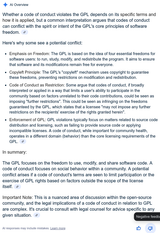Search Results
7/5/2025, 11:59:46 AM
AI Overview
Whether a code of conduct violates the GPL depends on its
specific terms and how it is applied, but a common interpretation argues that codes of conduct can conflict with the spirit or intent of the GPL's core principles of software freedom.
Here's why some see a potential conflict:
Emphasis on Freedom: The GPL is based on the idea of four essential freedoms for software users: to run, study, modify, and redistribute the program. It aims to ensure that software and its modifications remain free for everyone.
Copyleft Principle: The GPL's "copyleft" mechanism uses copyright to guarantee these freedoms, preventing restrictions on modification and redistribution.
Code of Conduct as Restriction: Some argue that codes of conduct, if broadly interpreted or applied in a way that limits a user's ability to participate in the community based on factors unrelated to their code contributions, could be seen as imposing "further restrictions". This could be seen as infringing on the freedoms guaranteed by the GPL, which states that a licensee "may not impose any further restrictions on the recipients' exercise of the rights granted herein".
Enforcement of GPL: GPL violations typically focus on matters related to source code distribution and licensing, such as failing to provide source code or applying incompatible licenses. A code of conduct, while important for community health, operates in a different domain (behavior) than the core licensing requirements of the GPL.
In summary:
The GPL focuses on the freedom to use, modify, and share software code. A code of conduct focuses on social behavior within a community. A potential conflict arises if a code of conduct's terms are seen to limit participation or the exercise of GPL rights based on factors outside the scope of the license itself.
Important Note: This is a nuanced area of discussion within the open-source community, and the legal implications of a code of conduct in relation to GPL are
Whether a code of conduct violates the GPL depends on its
specific terms and how it is applied, but a common interpretation argues that codes of conduct can conflict with the spirit or intent of the GPL's core principles of software freedom.
Here's why some see a potential conflict:
Emphasis on Freedom: The GPL is based on the idea of four essential freedoms for software users: to run, study, modify, and redistribute the program. It aims to ensure that software and its modifications remain free for everyone.
Copyleft Principle: The GPL's "copyleft" mechanism uses copyright to guarantee these freedoms, preventing restrictions on modification and redistribution.
Code of Conduct as Restriction: Some argue that codes of conduct, if broadly interpreted or applied in a way that limits a user's ability to participate in the community based on factors unrelated to their code contributions, could be seen as imposing "further restrictions". This could be seen as infringing on the freedoms guaranteed by the GPL, which states that a licensee "may not impose any further restrictions on the recipients' exercise of the rights granted herein".
Enforcement of GPL: GPL violations typically focus on matters related to source code distribution and licensing, such as failing to provide source code or applying incompatible licenses. A code of conduct, while important for community health, operates in a different domain (behavior) than the core licensing requirements of the GPL.
In summary:
The GPL focuses on the freedom to use, modify, and share software code. A code of conduct focuses on social behavior within a community. A potential conflict arises if a code of conduct's terms are seen to limit participation or the exercise of GPL rights based on factors outside the scope of the license itself.
Important Note: This is a nuanced area of discussion within the open-source community, and the legal implications of a code of conduct in relation to GPL are
Page 1
